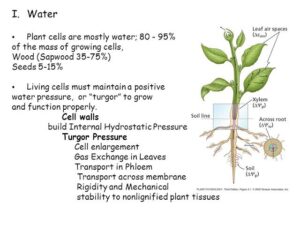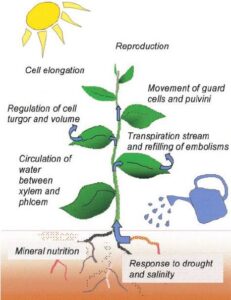Back to: Botany 400 Level
My brilliant Afrilearn scholar, welcome to another exciting lesson! I hope you’re having a fantastic day. Imagine you plant a seed, but you forget to water it. Days pass, and nothing happens. But the moment you add water, the seed swells, softens, and soon, a tiny shoot emerges. That’s the power of water! Today, we’ll be learning about the Properties of Water and Its Role in Plant Cells. By the end of this lesson, you’ll understand why water is life—not just for us but also for plants.
Properties of water and its role in plant cells
Have you ever noticed how fresh and firm your vegetables look in the morning but become soft and wilted when left outside for too long? That’s because plants, just like humans, depend on water to stay strong and healthy.
Water makes up about 70-90% of a plant’s body. Without it, plants cannot transport nutrients, make food, or even maintain their shape. It is so important that a plant deprived of water for too long will eventually dry up and die. But why is water so essential? The answer lies in its unique properties!

Properties of Water
Water has special properties that make it perfect for supporting plant life:
Cohesion and Adhesion (Water Sticks Together and to Surfaces)
Cohesion means water molecules stick to each other. This helps in the movement of water from roots to leaves through the plant’s xylem.
Adhesion means water sticks to other surfaces, helping it move through narrow tubes in the plant.
High Heat Capacity (Water Absorbs and Releases Heat Slowly)
Water helps plants maintain a stable temperature, protecting them from sudden temperature changes.
Solvent Property (Water Dissolves Many Substances)
Water dissolves minerals and nutrients in the soil, making them available for plant uptake through the roots.
Capillary Action (Water Moves Upwards in Plants)
Due to cohesion and adhesion, water can move up through the plant’s tiny tubes (xylem) against gravity, helping it reach the leaves.
Expansion on Freezing (Water Protects Plants in Cold Conditions)
Unlike most substances, water expands when it freezes. This prevents plant cells from being completely crushed in freezing temperatures.
Role of Water in Plant Cells
Water is not just for drinking—it plays several roles in plant cells, helping them survive and grow:
Transport of Nutrients and Minerals
Water helps dissolve and carry essential nutrients from the soil into plant roots and then throughout the plant.
Photosynthesis (Making Food in Leaves)
Without water, photosynthesis cannot take place. Water provides the hydrogen needed to form glucose (plant food).
Turgor Pressure (Keeping Plants Firm and Upright)
Water fills plant cells, making them firm. When a plant lacks water, it wilts because its cells lose pressure.
Cooling through Transpiration
Water evaporates from leaves in a process called transpiration, helping to cool the plant, just like sweat cools our bodies.
Growth and Germination
Seeds need water to activate enzymes that trigger germination and root development.
Think about a fresh bunch of ewedu (jute leaves) at the market. When left out in the sun for too long, it wilts. But if you soak it in water, it becomes fresh again. That’s because water restores turgor pressure in the plant cells.

Another example is maize plants during the dry season. If they don’t get enough water, their leaves curl up to reduce water loss. But once rain falls, they straighten up again. This shows how water affects plant structure and survival.
Summary
Water is essential for plant life due to its unique properties, such as cohesion, adhesion, high heat capacity, solvent ability, and capillary action. In plant cells, water helps in transporting nutrients, photosynthesis, turgor pressure, transpiration, and growth. Without water, plants would not survive, and food production would be impossible.
Evaluation
- What is cohesion, and how does it help plants?
- Explain why water is called the “universal solvent.”
- How does water help in photosynthesis?
- Why do plants wilt when they lack water?
Learning is like watering a plant—the more you nurture your knowledge, the stronger it grows! Keep going, my scholar, because you are on your way to greatness. See you in the next lesson! Keep shining!
